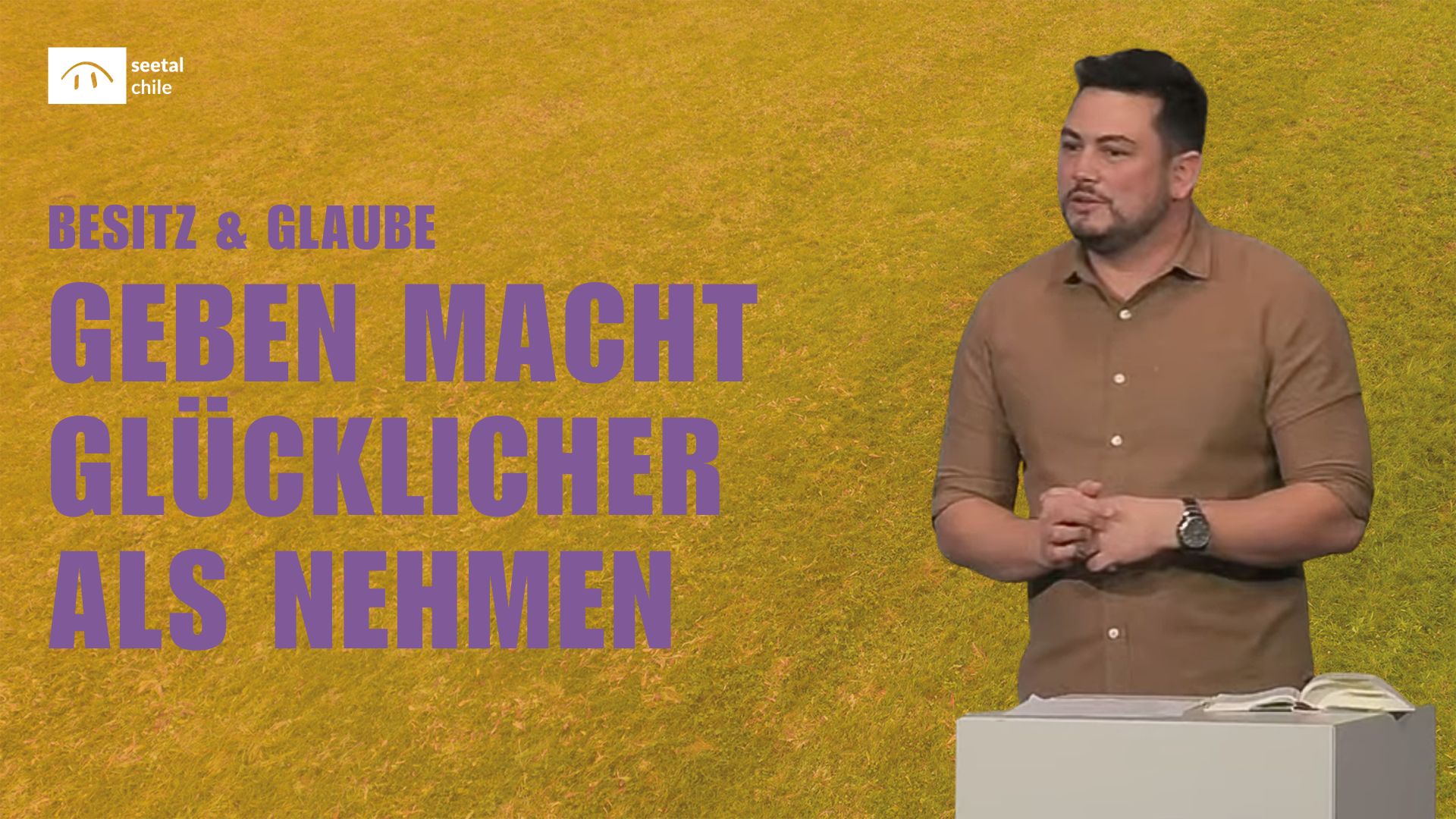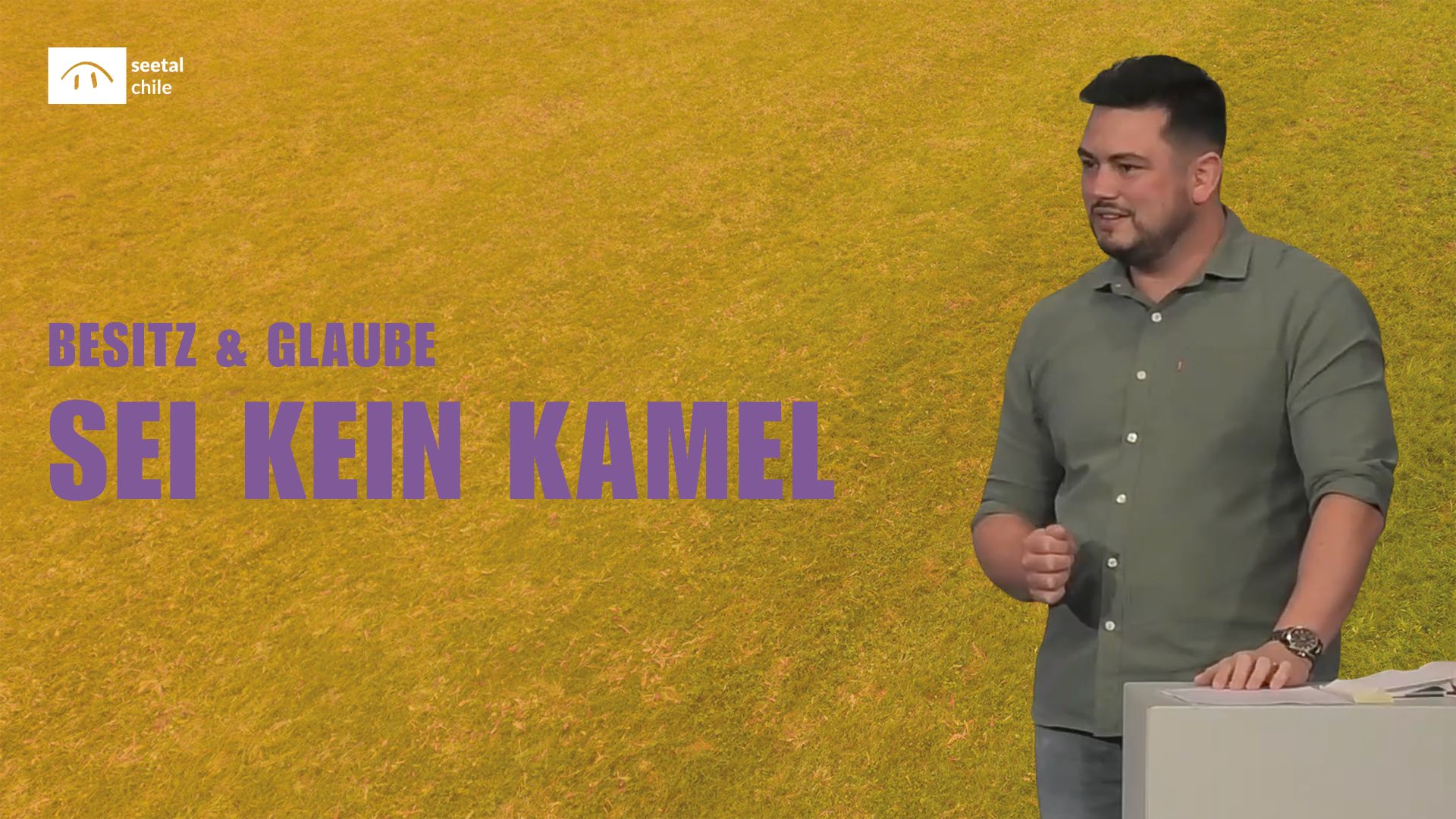Creation & faith | Clapping your hands with the trees
Series: EIFACH muetig – with Jesus as a role model | Bible text: Romans 1:20; Psalm 19:2–5
Albert Einstein is said to have once said: «The first sip from the cup of natural science makes you atheistic, but God is waiting at the bottom of the cup.» It’s like this: God reveals Himself in His creation and therefore a person can also encounter Him there. This kind of encounter has a healing effect on our spiritual, physical and mental health. And – we will join in the praise of creation and sing praises to God together.
Sometimes there are art exhibitions in which many works by one artist are shown. The curators then draw conclusions about the artist as a person on the basis of his or her manner of expression and a comprehensive characterisation is created. C.H. Spurgeon: «Everything that is created by the hand of such a master as God also harbours parts of him. There are beautiful places on this marvellous planet that should make even those who blaspheme God believe. When I stand in the midst of mountains, I can only say: anyone who thinks that God does not exist here is crazy.»
God reveals himself in his creation
Paul is convinced: «Since the creation of the world, people have seen the earth and the heavens and everything that God has created, and can clearly recognise Him, the invisible God, in His eternal power and divine essence. Therefore, they have no excuse for not having known about God.» (Romans 1:20 NLB). People can infer the existence and attributes of God by observing the world around them, the laws of nature and the beauty of creation. Albert Einstein said: «The first sip from the cup of natural science makes you atheistic, but God is waiting at the bottom of the cup.» Through creation we can become more familiar with God’s heart.
God reveals himself to us humans through various channels:
- Through His WordMartin Luther called the Bible a manger in which the baby Jesus lies; in our amazement at the manger, we should not forget to worship the child himself.
- Through personal impressionsSometimes God reveals himself very directly to a person, for example through a dream, through an encounter with another person or through divine impressions.
- Through Jesus: God has shown himself to us humans very clearly in the person of Jesus. «Christ is the image of the invisible God. He was already there before God created anything and is the first of all creation» (Colossians 1:15 NLB).
But the source of revelation, which is accessible to all people of all backgrounds at all times, is creation. Astronaut John Glenn, who flew into space in 1998, says: «To look at the earth from this vantage point, to see the marvellous creation from here and not believe in God – that is unimaginable for me.»
King David (ca. 1000 BC) agrees with him: «The heavens proclaim the glory of God and the firmament bears witness to his marvellous works. One day tells another, and one night tells another. Without speech and without words, their voice is silent, but their message spreads over the whole earth and their words over the whole world […]» (Psalm 19:2–5 NLB).
In other words, open your eyes, look around, sit down and pay attention. Creation constantly speaks volumes about God’s supernatural character. The mighty mountains and the vastness of the night sky speak of God’s greatness. Majestic waterfalls, tornadoes, violent hurricanes and explosive volcanoes point to God’s mighty power. And the daily discoveries of microbiologists, marine biologists and physicists provide a rich commentary on God’s wisdom, complexity and creativity. We see the same creativity and love in the animal kingdom. The protective care of a mother hen for her chicks gives us a glimpse into the heart of our heavenly Father. The tenderness of a lioness with her playful cubs is a reflection of God’s grace and patience. Above all, however, the amazing abilities and achievements of humans point us to a designer who must be remarkable beyond measure. In the mirror (and in that of our neighbour) we see the signs of the one who created us: Creativity, a longing for community and a desire to make a difference.
Encountering God in his creation
If you feel that reading books and listening to sermons is no longer getting you anywhere, then put on your jacket and trekking shoes and go out to the school, which is always open. Just the other day, I was somehow blocked in the office while writing a sermon. On a walk through the forest, I had the feeling that I was meeting God in the flesh. His creativity helped me out of my block.
The attentive stay in His creation is inspiring and faith-promoting and takes on a special meaning on difficult paths. Job lost all his possessions and – even worse – all ten of his children. His suffering and grief must have been immeasurable. In order to survive, his attention was constantly focussed on creation. Chapter by chapter, events from nature are described. The afflicted Job himself spoke the following words when he commands his fate to God: «Ask the animals, they will teach you. Ask the birds in the sky, they will tell you. Turn your thoughts to the earth, it will teach you. Even the fish in the sea will tell you. They all know that the Lord created them. For the life of every creature and the breath of every human being is in his hand» (Job 12:7–10 NLB). Job, through such lessons of nature, ended up at the point where he could say, «Until now I only knew you from hearsay, but now I have seen you with my own eyes» (Job 42:5 NLB).
The danger is that people move their entire worship service into nature. But that is not the message of the Bible. Physical fellowship with other inhabitants of God’s house is important, even if withdrawal sometimes seems to be the easier option. Spending time in creation is not a substitute for church, but an important addition. Adrian Jaggi, head of BESJ (Bund Evangelischer Schweizer Jungscharen), recently said the following in a magazine: «Community, a connection to creation and faith are powerful resources for the mental health of children and young people.» This is in line with the message of the Bible. It needs both: fellowship with other followers as well as a connection to creation.
Praising God with his creation
One of the greatest songs of faith – «How great you are» – celebrates the way God draws us to himself through his creation: When through the woods and the bright meadows – I hear the birds» bright song as I wander, – when I can look down into the valley from the airy heights, – a little brook rushes, a wind blows by, – then my heart rejoices in you, great ruler: – How great you are! How great you are!
The vocation of man is: Reflecting the glory of God into the world and bringing the praise of all creation to God. The whole of creation is already singing praises: «Let the sea and all that is in it praise him! Let the earth and everything that lives on it cheer him. Let the rivers clap their hands for joy! Let the mountains sing joyful songs before the LORD» (Psalm 98:7–8 NLB). Not only the rivers, but also the trees clap their hands: «You will go forth in joy and be led in peace. The mountains and hills will sing with joy before you and all the trees of the field will clap their hands!» (Isaiah 55:12 NLB).
When John, the writer of the Book of Revelation, gets a glimpse into the invisible reality of God, he sees the following: «And then I heard every creature in heaven and on earth and under the earth and in the sea singing, «Praise and honour and glory and power be to him who sits on the throne, and to the Lamb for ever and ever» » (Revelation 5:13 NLB).
Being attentive to creation acts as a powerful catalyst for praising God in our lives. When we join in the praise of creation, we live fully in the heart of our calling. It is of great importance that we do not worship creation, but the Creator. Creation is not God, but merely a place of revelation for God. Followers of Jesus are also not animists. Animism is a religious and philosophical worldview that states that not only humans, but also animals, plants, natural objects and even phenomena such as water, wind or mountains have a soul or spirit. In animist belief systems, it is often assumed that these spirits or souls have an influence on people’s lives and that it is important to live in harmony with them.
We humans are part of the entire community of creation with a certain key position. As man and woman together, we are created in God’s image. In this world, we have a royal priestly function. The royal part consists of reflecting God’s sovereign rule and His wisdom into creation; as priests, we bring the praise of all creation to God. God bestows this calling, which originally applied to all people, on His chosen people (Exodus 19:6), the Israelites and the Church (1 Peter 2:9). Chosen – a person receives this title when they personally accept God’s offer of reconciliation, which bears the name Jesus Christ. When a person Jesus Christ as his Saviour, all the prerequisites are in place to fulfil the key function in God’s creation.
Possible questions for the small groups
Read the Bible text: Psalm 19:2–5; Job 12:7–10
A little suggestion: You could hold today’s small group evening in God’s creation.
- God reveals Himself in His creation. Have you already met Him there? Do you consciously seek Him in nature?
- Being mindful of creation is good for our spiritual, mental and physical health. What experiences have you had with this?
- What does it mean that the Bible says that the rivers and trees clap their hands in praise of God? How do you experience the song of praise of creation?
- The calling of man is to give the praise of all creation to God. What could this look like in concrete terms?
- What distinguishes humans from the rest of the community of creation? How would you describe his special position?




